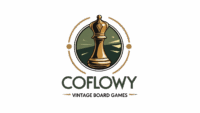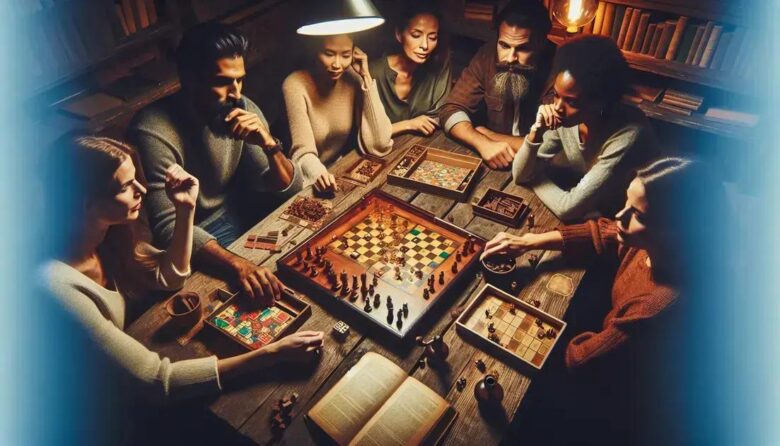Logical thinking vintage board games develop reasoning, problem-solving, and strategic skills through classic games like chess, Mastermind, and Clue, offering engaging mental challenges for all age groups.
Logical thinking vintage board games offer more than entertainment—they spark curiosity and challenge the brain. Ever wondered how these classic games sharpen reasoning skills while keeping things fun? Let’s dive into some timeless favorites that make thinking a game itself.
how vintage board games encourage logical thinking
Vintage board games are more than just fun pastimes; they are excellent tools for developing strong logical thinking skills. These games challenge players to analyze situations, make strategic decisions, and anticipate opponents’ moves. For example, games like Chess and Checkers require careful planning and foresight, encouraging players to think several steps ahead.
Critical thinking through problem solving
Many classic games present puzzles or scenarios that demand players to evaluate options critically and choose the best course of action. This process reinforces logical reasoning by teaching pattern recognition and consequences evaluation.
Improving decision-making under pressure
Timed moves or limited resources in vintage games add a layer of challenge that promotes quick, logical thinking. Players learn to prioritize choices and adapt strategies dynamically.
Overall, vintage board games provide engaging, hands-on experiences that strengthen the brain’s problem-solving and reasoning abilities, making learning logical thinking enjoyable and interactive.
top classic games that boost reasoning skills
Several classic board games have stood the test of time because they effectively enhance reasoning skills. Games like Chess, Mastermind, and Clue challenge players to think logically, plan ahead, and analyze information carefully.
Chess
This game requires players to strategize moves while anticipating opponents’ responses. The complexity of chess improves problem-solving, critical thinking, and pattern recognition.
Mastermind
Mastermind is a code-breaking game that encourages logical deduction. Players must use clues and eliminate possibilities, sharpening their ability to reason step-by-step.
Clue (Cluedo)
Clue involves solving a mystery by gathering clues and making logical inferences. This game develops deductive reasoning and attention to detail.
By regularly playing these timeless classics, players of all ages build mental agility and refine their reasoning abilities in an enjoyable way.
strategies learned from vintage logic games
Vintage logic games teach players a variety of strategic thinking skills that remain valuable today. These games encourage foresight, planning, and adapting to changing scenarios.
Planning and foresight
Many classic games, such as chess, require players to think several moves ahead. This helps develop the ability to anticipate consequences and plan further actions accordingly.
Pattern recognition
Logic games often involve identifying patterns or sequences. Players sharpen their skills by recognizing trends and using these insights to gain an advantage.
Problem-solving approach
Games like Mastermind challenge players to test hypotheses and make logical deductions. This builds a systematic approach to resolving complex problems.
Flexibility and adaptation
Unexpected moves or events in vintage games teach players to adjust their strategies quickly. Learning to be flexible helps improve decision-making in dynamic situations.
By engaging regularly with vintage logic games, players strengthen these core strategies, enhancing mental agility and effective reasoning.
benefits of playing board games for the brain
Playing board games offers multiple benefits for the brain, improving mental functions in enjoyable ways. Engaging in these activities enhances memory, concentration, and critical thinking skills.
Memory enhancement
Board games often require remembering rules, strategies, and opponents’ moves. This continuous practice helps strengthen both short-term and long-term memory.
Improved focus and concentration
Successful gameplay demands sustained attention and the ability to avoid distractions. Regular play helps train the brain to maintain concentration for longer periods.
Boosting problem-solving skills
Many board games challenge players to solve complex problems or puzzles. This encourages creative thinking and the ability to approach challenges from different angles.
Social and emotional benefits
Playing with others promotes social interaction, communication, and teamwork, which are essential for emotional intelligence and mental well-being.
Overall, board games serve as a fun and effective way to keep the brain active and sharp across all age groups.
choosing the right vintage games for different ages
Choosing the right vintage games for different ages ensures that players stay engaged and benefit from the learning experience. Consider the complexity and length of the games when selecting the best fit.
For young children
Games with simple rules and bright visuals like Guess Who? or Connect Four help develop basic logical thinking without overwhelming them.
For older children and teens
Games such as Chess or Checkers introduce strategic thinking and planning skills. These games require more focus and patience, matching their growing cognitive abilities.
For adults
Classic games like Mastermind, Clue, or advanced chess offer deep challenges, encouraging complex problem-solving and critical thinking.
Consider game length and player preferences
Shorter games work great for younger players or casual settings, while longer, more involved games suit experienced players ready for a challenge.
Matching vintage games to players’ ages and interests helps maximize engagement, learning, and fun across all generations.
tips for introducing classic logic games to new players
Introducing classic logic games to new players can be a fun and rewarding experience with the right approach. Start by choosing games with easy-to-understand rules to avoid overwhelming beginners.
Explain the basics clearly
Use simple language and demonstrate moves or strategies hands-on. Visual examples help new players grasp concepts faster.
Encourage learning through play
Allow beginners to explore the game casually before focusing on complex tactics. This encourages confidence and maintains interest.
Be patient and supportive
Every new player learns at their own pace. Offer tips and positive feedback to build their skills and motivation.
Play cooperatively at first
Try cooperative game modes or team play to reduce pressure and promote collaboration while learning the rules.
By nurturing a positive environment and pacing the introduction, classic logic games become accessible and enjoyable for all players.
Bringing classic logic games into your life
Classic logic games offer a fun way to boost your brainpower and sharpen your thinking. By choosing the right games and introducing them thoughtfully, anyone can enjoy their benefits.
These games help develop skills like problem-solving, planning, and focus while encouraging social interaction. Whether you’re new or experienced, playing vintage board games can be a rewarding challenge.
So, why not invite friends or family for a game night and experience the joy of strategic thinking together?

